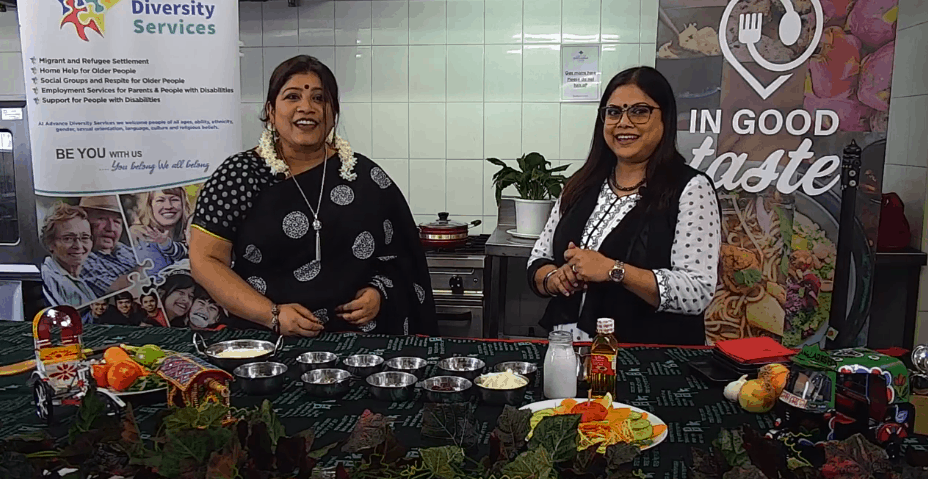Advance Diversity Services (ADS) partnered with Georges River Council (GRC) to launch three new videos to get tastebuds tingling as part of the In Good Taste festival in February.
The videos celebrate the International Day of the Mother Language, on February 21, which aims to increase awareness of the vital role languages play in preserving cultural heritage, ensuring cultural diversity and strengthening cooperation. This is the first year that GRC is hosting this event, but intends to celebrate it every year from now on.
ADS’ Tastes from the Homeland showcases Thai, Nepalese and Bangla cuisines cooked onscreen by three accomplished local community chefs. Each chef gives step-by-step instructions to guide people to cook their recipes at home.
Thanyarat Khotdet prepares two types of Thai Green papaya salad, Suraj Pradhan cooks up a warming plate of Nepalese momos and Nusrat Tanjina makes a tasty Bangla Hilsa fish pulao. Their conversations with ADS community workers help viewers understand where their dishes come from and reveal local sources and substitutes for traditional ingredients.
Thanyarat has been in Australia for 16 years and is a member of ADS’s Thai Mother’s Group. She demonstrated two versions of the green papaya salad – one from central Thailand (som tum Thai) and the other from north-east Thailand (som tam poo bala) which features anchovy, crab and eggplant.
Kay (Sineenat Khantaracha), Thai Community Worker for ADS, said green papaya is very popular in south-east Asia, including Thailand. The tastes of the two salads was very different, she said. The first was sweet and sour and the second spicy and salty.
Kay also explained that ‘som’ in the recipe title means ‘sour’, and ‘sum’ means to pound the ingredients. ‘Bang, bang’ added Thanyarat as she demonstrated how to use a large wooden pestle to macerate and mix the ingredients.
‘Taste the salad before serving,’ Kay said, ‘and if it is too spicy for you, just add some more papaya.’
Suraj Pradhan has been in Australia for 10 years. He loves cooking and is an active participant in ADS’s Nepalese Reference Group. He said momos were originally from the Kathmandu Valley’s Indigenous people called Newars who traded with Tibet. The Tibetan dumplings inspired the Newars to use Nepalese spices to make their own version of the snack.
‘Food travels!’ Suraj said. ‘Momos have now spread to every corner of the world.’
Rishi Acharya, Nepalese Community Worker for ADS, said that the whole family gets involved in creating momos – first shopping and then cooking the popular snack at home.
Nusrat Tanjina is a chef and cooking is her passion. She has been in Australia for 11 years and is a member of ADS’s Bangladeshi Reference Group.
Nusrat said her dish is cooked with the traditional fish known as Hilsa (the national fish of Bangladesh) and also features Kalijira rice which only grows in Bangladesh. Mustard oil is also a special ingredient, which enhances the aroma and flavour.
Nusrat said that Hilsa fish is so soft it must be moved very gently in the pan. ‘In Bangladesh we say, “How you handle your girlfriend is how you must handle the fish!”’
Tasneem Rashid, the Bangladeshi Community worker with ADS said Nusrat’s dish offered ‘The taste from our homeland on our special day.
‘The smell is so good!’
Jenny Tang, Community Development Worker at ADS, said the Tastes from the Homeland video project was a creative way to reconnect communities in the wake of the pandemic and to honour the diversity of mother languages used by people across the region.
‘Cooking can convey love, comfort and create memories – so, you will want to replicate these recipes!’
Magdaline Shenton-Kaleido, Team Leader, Emerging Communities, at ADS said the Tastes from the Homeland recipes which the cooks graciously shared from their motherlands, will appear in a cookbook for next year’s annual event.
‘I can think of no better way for ADS to have contributed to the In Good Taste festival and its goals to celebrate diversity and belonging and to foster connectedness, sustainability and inclusiveness.’
Ms Shenton-Kaleido quoted Audrey Azoulay Director-General of UNESCO, who has noted that when 40 per cent of the world’s inhabitants do not have access to education in the language they speak or understand best, it hinders their learning, as well as their access to heritage and cultural expressions.
‘This year, special attention is focused on multilingual education from early childhood so that for children, their mother tongue is always an asset.’
View the Tastes from the Homeland videos at bit.ly/goodtaste2021
Or directly link to individual videos:
Bangla Hilsa fish pulao: https://youtu.be/j2qLeZPLh6c
Nepalese chicken momo: https://youtu.be/dAYvEYRUgSs
Thai green papaya salad: https://youtu.be/6jvIoHpjdRI
For more information about In Good Taste see https://www.georgesriver.nsw.gov.au/Home
____
Caption: Nusrat Tanjina (left) makes a tasty Bangla Hilsa fish pulao as she chats with Tasneem Rashid.

